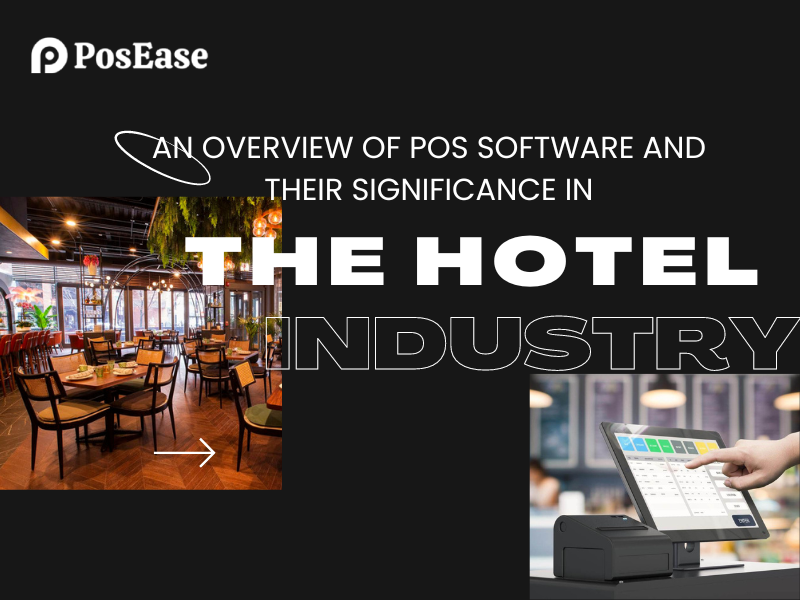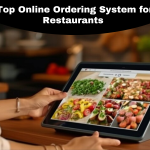An Overview of POS Software and Their Significance in the Hotel Industry

In today’s fast-paced hospitality industry, Efficiency and customer satisfaction are crucial in today’s fast-paced hospitality industry. One of the key tools helping hotels meet these demands is Point of Sale (POS) software. In this blog, we delve into the significance of POS software in the hotel industry and explore its various aspects, features, and future trends.
Importance of POS Software in the Hotel Industry:
1. Streamlining Operations: POS software integrates seamlessly with various hotel departments, from front desk to housekeeping, enabling efficient coordination of tasks and resources. It automates processes like room assignments, check-ins, and check-outs, reducing wait times and improving guest satisfaction.
2. Enhancing Customer Experience: By facilitating quicker service and personalized interactions, POS software contributes to an enhanced guest experience. For instance, staff can access guest preferences and purchase history at the touch of a button, allowing them to offer tailored recommendations and anticipate needs.
3. Improving Efficiency and Accuracy: Automation and real-time data tracking minimize errors and improve operational efficiency in tasks like order management and inventory control. Automated alerts for low inventory levels prevent stockouts, while built-in quality control measures ensure consistency in service delivery.
4. Data Management and Analytics: POS systems gather valuable data that hotels can analyze to gain insights into customer preferences, revenue trends, and operational performance. Detailed reports on sales, occupancy rates, and customer feedback enable informed decision-making and strategic planning for future growth.
Key Features of POS Software for Hotels:
1. Reservation Management: Efficient handling of room reservations, check-ins, and check-outs, with the ability to customize rates, packages, and discounts based on demand and seasonality. Integration with online booking platforms enables real-time availability updates and seamless reservation processing.
2. Order Management: Managing orders for food, beverages, and other services within the hotel, with options for tableside ordering, split billing, and kitchen display integration to streamline service workflows. Customizable menus and modifiers accommodate guest preferences and dietary restrictions, enhancing the dining experience.
3. Billing and Invoicing: Generating accurate bills and invoices for guests, incorporating various charges seamlessly, such as room rates, meals, spa services, and additional amenities. Integration with payment gateways enables secure processing of credit card transactions and automatic posting of charges to guest folios.
4. Inventory Management: Tracking and managing inventory levels for restaurant supplies, minibar items, and other goods, with features for inventory forecasting, vendor management, and recipe costing. Barcode scanning and RFID tagging facilitate efficient stock replenishment and inventory audits, minimizing wastage and shrinkage.
5. Reporting and Analytics: Providing detailed reports and analytics on sales, revenue, and inventory turnover, with customizable dashboards and KPI tracking. Insights into customer spending patterns, peak hours, and popular menu items inform marketing strategies and menu engineering decisions, driving profitability and guest loyalty.
Types of POS Software for Hotels:
1. On-Premise POS Systems: Installed and maintained on-site, offering robust functionality and control over data security and system configuration. Suitable for larger properties with complex operational requirements and IT infrastructure.
2. Cloud-Based POS Systems: Hosted on remote servers, providing flexibility, scalability, and accessibility from any location with internet connectivity. Ideal for smaller hotels or those with multiple outlets, offering lower upfront costs and automatic software updates without the need for onsite maintenance.
Considerations for Choosing the Right POS Software:
1. Integration with Existing Systems: Compatibility with other hotel systems like Hotel Management Systems (HMS), Customer Relationship Management (CRM) software, and accounting platforms to ensure seamless data exchange and workflow automation.
2. Scalability: Ability to accommodate the growing needs of the hotel as it expands, with options to add new features, users, and locations without significant disruption to operations.
3. User-Friendliness: Intuitive interface for easy adoption by staff members of all skill levels, with features like drag-and-drop menu customization, touchscreen support, and role-based access controls.
4. Cost-Effectiveness: Balancing features and pricing to suit the hotel’s budget and requirements, considering factors like licensing fees, hardware costs, transaction fees, and ongoing support and maintenance expenses.
Case Studies: Successful Implementation of POS Software in Hotels:
Example 1: A renowned luxury hotel chain achieves seamless operations and enhanced guest experiences through the integration of a cloud-based POS system with its existing PMS and CRM platforms. Real-time data sharing between departments allows for personalized service delivery and targeted marketing campaigns, resulting in increased guest satisfaction and repeat bookings.
Example 2: A boutique hotel optimizes its efficiency and revenue generation by implementing an on-premise POS solution tailored to its unique needs. Customized reporting capabilities and integration with its inventory management system enable precise cost control and menu optimization, while intuitive touchscreen interfaces streamline order taking and payment processing, reducing wait times and enhancing staff productivity.
Future Trends in POS Software for Hotels:
1. Mobile POS Solutions: Empowering staff to provide on-the-go service using tablets or smartphones, with features like mobile ordering, mobile payments, and mobile check-in/check-out to enhance guest convenience and reduce reliance on traditional POS terminals.
2. Artificial Intelligence and Machine Learning: Leveraging AI for predictive analytics, personalized recommendations, and automated processes, such as dynamic pricing optimization, demand forecasting, and chatbot assistance for guest inquiries and reservations.
3. Contactless Payments: Responding to changing consumer preferences by offering secure and convenient payment options, including NFC-enabled payment terminals, mobile wallets, QR code payments, and tokenization technology to minimize physical contact and enhance transaction security.
Conclusion:
In conclusion, POS software plays a pivotal role in driving efficiency, enhancing customer experiences, and optimizing revenue streams in the hotel industry. By leveraging the right POS solution and staying abreast of emerging trends, hotels can stay competitive and meet the evolving needs of modern travelers, ensuring long-term success and sustainability in a dynamic market landscape.
Search
Category
Recent Posts




